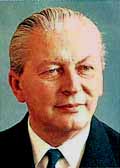 |
Kurt Georg Kiesinger
b. 6 Apr 1904, Ebingen, Württemberg, German Reich
d. 9 Mar 1988, Tübingen, West Germany |
| Title: |
Bundeskanzler (Federal Chancellor) |
Term: |
1 Dec 1966 - 21 Oct 1969 |
| Chronology: |
1 Dec 1966, elected, 77th session of the fifth Bundestag, Plenarsaal, Bundeshaus, Bonn [1] |
| |
1 Dec 1966,
appointed by the Bundespräsident (Federal President) [1] |
| |
1 Dec 1966,
oath of office taken, 77th session of the fifth Bundestag (continued after a break), Plenarsaal, Bundeshaus, Bonn [1] |
| |
21 Oct 1969,
ceased to exercise the duties of office with the swearing-in of successor [2] |
| Biography: |
Kurt Georg Kiesinger graduated as lawyer two years before the Nazi came to power in Germany. In 1933 he joined the National Socialist party and began a law practice in Berlin. In 1940 Kiesinger received a job in the Reich foreign ministry's radio propaganda department. After the war he was interned by U.S. forces and spent several months in the Ludwigsburg camp, but was finally acquitted by the de-Nazification courts. By the time of the first elections to the Bundestag Kiesinger joined the Christian Democratic Union (CDU) and won a seat in the new German parliament. In 1950 he was made a member of the extended CDU party board and in 1951 was promoted to the membership in the CDU executive board. In 1954-1958, Kiesinger served on the Bundestag committee for foreign affairs, but he had to gave up his posts in the lower chamber after he was elected minister-president of Baden-Württemberg (17 Dec 1958 - 1 Dec 1966). In 1962-1963, Kiesinger served as the president of the Bundesrat. In 1966 the longtime coalition of the CDU/CSU and of the Free Democrats (FDP) was broke up and Kiesinger was nominated to replace Ludwig Erhard as Federal Chancellor. He was elected by the votes of three major parties - CDU/CSU, FDP and Social Democrats (SPD) on 1 Dec 1966 and appointed by the Federal President on the same day. The government formed by Kiesinger became known as a grand coalition and remained in power for nearly three years. The social democratic leader Willy Brandt was appointed Deputy Federal Chancellor and Foreign Minister. In 1967 Kiesinger also replaced Erhard as the party federal chairman. Kiesinger and Brandt eased tensions with the Soviet bloc nations and established diplomatic relations with Czechoslovakia, Romania and Yugoslavia. A number of measures based on short-term planning brought positive results in overcoming economic recession. In the election of 1969, the CSD/CSU lost only three seats in the Bundestag, but the Social Democrats increased their number of deputies by 22 and preferred to form a socialist-libral coalition with FDP thus ending the 20-year ruling of the CDU chancellors. Kiesinger continued to head the CDU/CSU in opposition until July 1971, when he decided not to participate in the elections of the party chairman and remained a member of the Bundestag until 1980. Biography source: [3] |
| Elections: |
| Date |
1 Dec 1966 |
| Bundestag members/absolute majority |
496/249 |
| Votes cast |
473 (+22) |
| Yes |
340 (+16) |
| No |
109 (+3) |
| Abstentions |
23 (+3) |
| Invalid |
1 |
|
| Election results (votes of the representatives of Berlin are shown in parentheses); source: [1] |
| |
| [1] |
Verhandlungen des Deutschen Bundestages - Stenographische Berichte (Bonn, 1950-1990; Berlin, 1990-), 5. Wahlperiode, Bd. 62, S. 3540. |
| [2] |
Verhandlungen des Deutschen Bundestages - Stenographische Berichte (Bonn, 1950-1990; Berlin, 1990-), 6. Wahlperiode, Bd. 71, S. 11. |
| [3] |
"Die deutschen Kanzler von Bismarck bis Kohl", ed. by Wilhelm von Sternburg (Berlin: Aufbau-Taschenbuch-Verl., 1998). |

